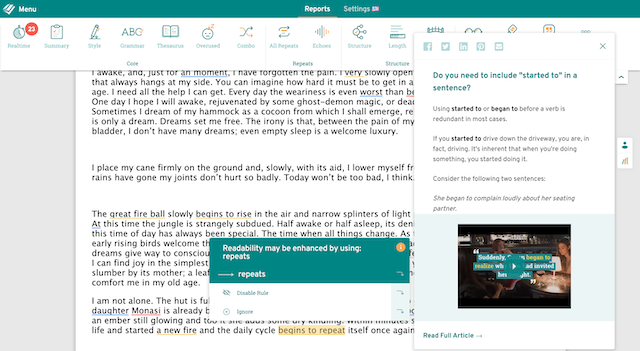
For a long time, Apple had convinced the world of creatives that in order to be successful, you had to own a Macbook. It was the standard-bearer for creative minds – a slick, metallic device that showed the world you were working on something really special.
Many creatives launched their careers on Macbooks. Some of them swear by their machines. I've seen social media posts where creatives say they "couldn't have done it without" their Apple computer.
Are they right? Yes, but not for the reason they think.
Macbooks aren't inherently "better" than any other device. Successful writers all throughout history have changed the world creating content with Macbooks, typewriters, pen and paper, ink and quill... and some even used Windows machines.
The reason these creatives were able to launch their careers was not because the expensive computer was so good – it's because it was expensive.
Many experts will tell you one great way of making a habit stick is by investing in it. Spending money on something is a psychological trick that demonstrates to yourself that this habit is important to you.
When a writer buys a $1,000+ Macbook, they're committing to themselves that they are going to take their work seriously.
But who's got that kind of money lying around?
Now is the best time to invest in your work
This isn't going to be about why you should buy a Macbook. I didn't. (More on that in a moment.)
However, I do think that spending a little bit of money on your writing career can put you in line to get some amazing work done. You can invest in your writing, make that commitment to yourself, and potentially give your work a boost.
You just don't have to spend a thousand bucks to do it.
There's never been a better time to buy into your writing. Apps and services are dirt cheap thanks to the internet. Some smart people out there have invested resources into building useful tools that don't cost an arm or a leg, leaving those limbs free for more writing.
I'm a firm believer in saving money and being frugal. I'm also a firm believer in investing in your craft. Here are a handful of ways you can make that happen without emptying out your wallet.

Education
One of the best ways to invest in yourself is by investing in your education. A smarter writer is a better writer, right?
Not only does this produce real dividends in your work, it's also the most affordable way to better your writing. You can find educational tools and services that fit with the way you like to learn – video, audio, text, and otherwise.
There is no limit on your education in today's world.
YouTube
This is my favorite because it doesn't cost a dime unless you want to invest in YouTube Premium for that ad-free experience (which, by the way, is totally worth it). I don't want to focus too much on free resources because this article is about spending money, of course. But YouTube is such a wealth of knowledge that I would be remiss if I didn't put it in here.
There are plenty of writer-specific channels that can help you, like:
- Brandon Sanderson. A popular fantasy author who runs full-length lectures on his channel, detailing concepts like worldbuilding and plot structure. He even goes into detail on the inside story of the publishing industry.
- Hello Future Me. A combination of deep research, a passion for storytelling, and goofiness. This is not just an education, it's also fun.
- Lessons from the Screenplay. I love movies. While most movies today are terrible, the good ones of past and present can elicit real emotion from the viewer through storytelling. This is my favorite channel on the list, and it's fascinating to watch how the structure of a story can affect the viewer.
- Jenna Moreci. A relentlessly upbeat author, Jenna is another favorite of mine. She goes through great concepts, like tropes in romance and fantasy, or character building, with an entertaining angle. Plus, most videos clock in at 10 minutes or less, providing you with fast-paced learning across a lot of different areas of writing.
Skillshare or Udemy
I don't really have a preference here, but both are great sources for affordable classes that can walk you through any area of writing or publishing that you might need. Plus, they're always discounted!
Masterclass
What, you don't trust the "experts" in Skillshare or Udemy? Why not take a class with a heavyweight, like Stephen King or James Patterson? Masterclass is a newer resource from the last few years, and they've put together video courses with very successful people. Might be worth investing for you.
Books
Too obvious? I'm not putting a list of good books here because you know them already. Investing in 4–5 great books on storytelling, productivity, and the basics of writing could give you a Master's-level education in creativity for less than $100.
Writing apps and services
I have a problem with this portion of the list because I'm a sucker for a good writing app or service. I suffer from "shiny new toy" syndrome, where I come across an ad for a fancy-looking app and I think, Heyyyy, maybe I do need an app that measures that! or whatever.
But a good, paid app can be effective if you commit to using it properly. Here are a few that work for many writers:
ProWritingAid
Come on. You knew this would be on here. It's like having an editor and a proofreader over your shoulder whenever you need it. The editor analyses your text and highlights a variety of key writing issues, such as overused words, sentence structure, punctuation issues, repeated phrases, consistency, dialogue, pacing and readability. It helps you learn as you edit, making you a stronger writer.

Scrivener
The go-to. If you're a writer and you haven't heard of Scrivener at some point, you're probably not on the internet much. Scrivener is a beast of a tool, but many authors swear by it. Even bloggers use it. I've used it in the past, but once I switched to a Chromebook, it stopped being an option. For about $40, you get a writing tool that can do just about anything for you.
Novlr
This web-based tool is like Scrivener for the common writer. It is feature-packed, with a development team bent on delivering new features and bug fixes regularly. I really like Novlr personally, and it's a great company that cares about the writers they serve.
Equipment
I am a freelance writer, and I was put on retainer by a client who demanded that I get a Macbook because I had to run certain apps that a Chromebook wouldn't run. I bought a Macbook Air, and then the client fired me three months later.
I kept the Macbook for almost two years, because it was a great machine, it was paid for, and it gave me a lot of options for writing. It was an investment that did pay off. But you don't have to spend $1,000 on equipment. You can spend a lot less and get some really handy writing tools, such as...
A solid Chromebook. I do all of my writing on a Chromebook. I have for years. I sold my Macbook and bought a used Pixelbook and haven't looked back. Currently, the Lenovo Chromebook Duet is the hot new machine, and for only $300, you have a pro-level device. Get a cheap one, if you need to! They're blazing fast and can handle what you throw at it.
Snowball ICE microphone. Do you like to use dictation? Many writers swear by it. Get a solid microphone like this one and make sure your dictation works beautifully every time. It's only $100, too.
A good chair. Fix up your back and neck and watch your productivity soar! A good ergonomic chair can run over a thousand dollars. Don't do this. I bought a great ergonomic chair for only $400 at a used office furniture store. Look around for deals. If "butt in seat" is the prevailing advice given to writers, then doesn't it make sense to get a really nice seat for your butt so you'll use it more?
How about writing in a co-working space?
This might not be a good fit for everyone, but it's worth considering. Having the ability to leave the home office and work from a different workspace can be a godsend for your writing career.
A co-working space may be expensive, depending on your definition of the word. Around here in Milwaukee, a monthly membership to a co-working space can run $80 to $225 per month. Not chump change! But it might be a worthwhile investment for you, if it makes that big of a difference in your productivity.
Personally, I invest in coffee and water at my local coffee shop. It costs me about $10 per day that I work from there, and I get the same co-working experience without the price tag.
Invest in yourself, your writing, and your productivity
The key, in all of these situations, is to think outside the box. Find ways to get the professional resources without the professional investment.
You can build a really great workspace with all the tools that the pros use at a fraction of the price – and still reap the benefits of investing in your work.
How do you invest in yourself?

